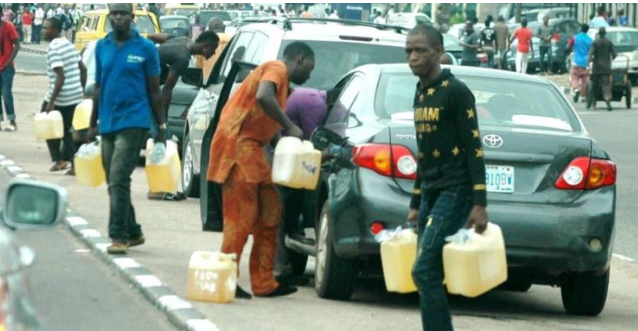News
Fuel Scarcity Worsens as Petrol Prices Surge: November 12th, 2024 Update

By Kayode Sanni-Arewa
As Nigerians face the impact of a recent increase in fuel prices announced by the Nigerian National Petroleum Company (NNPC) Limited, citizens continue to grapple with both rising costs and a scarcity of petrol, which has disrupted daily life.
Gists9ja reports on the latest developments surrounding petrol availability, escalating prices, and the reactions of both government officials and the public.
A significant step toward addressing these challenges was recently taken by the Independent Petroleum Marketers Association of Nigeria (IPMAN), which secured a new agreement with the Dangote Refinery for direct fuel supply. This partnership is seen as a strategic move to stabilize fuel distribution nationwide.
At a press briefing held in Abuja, IPMAN’s National President, Abubakar Garima, announced the partnership after discussions with the association’s National Working Committee. Garima stated that the primary goal of this collaboration is to ensure an uninterrupted and reasonably priced supply of Premium Motor Spirit (PMS) to consumers across Nigeria.
Following meetings with Aliko Dangote and his management team in Lagos, Garima shared that Dangote Refinery agreed to provide IPMAN with PMS, Automotive Gas Oil (AGO), and Dual Purpose Kerosene (DPK). These products will be supplied directly to IPMAN’s depots and retail outlets to streamline distribution channels.
“We are very pleased to have reached an understanding with Dangote Refinery. This agreement will allow us to source PMS, AGO, and DPK directly from the refinery,” Garima explained. He also encouraged IPMAN members to embrace this partnership, highlighting that the initiative would contribute to local economic growth and reinforce Nigeria’s foreign exchange reserves by reducing dependence on imported fuels.
Garima emphasized the broader economic potential of this deal, noting that this move toward self-sufficiency supports the administration’s agenda for a revitalized Nigeria. “By relying on local refineries like Dangote, IPMAN members can contribute to job creation and help advance President Bola Tinubu’s vision for economic stability and prosperity,” he said.
After extensive negotiations spanning several months, this agreement aims to boost efficiency in fuel supply, reduce fuel prices for consumers, and stimulate economic development.
The financial implications of fuel importation have shifted recently, as the cost of landing Premium Motor Spirit (PMS) in Nigeria decreased by approximately 20.34 percent over the past three months, reducing from ₦1,219 per litre to ₦971.57 per litre. This reduction in landing costs, which include expenses for importation and distribution, is attributed to changes in global oil prices and adjustments within the supply chain. Yet, despite these lowered landing costs, Nigerians have seen retail petrol prices rise significantly.
Since August 2024, the price of petrol has surged by ₦443, marking a 71.79 percent increase from ₦617 per litre to ₦1,060 per litre as of November 8, 2024. Independent marketers, facing their own rising costs, have been selling petrol at rates as high as ₦1,180 per litre in some regions.
Data from the Major Energies Marketers Association’s energy bulletin illustrates the pricing shifts. In August, oil marketers imported petrol at ₦1,219 per litre when Brent crude was priced at $80.72 per barrel, with an exchange rate of ₦1,611 per dollar. At that time, petrol was retailing at ₦617 per litre. By November, the landing cost had decreased to ₦971.57 per litre, with Brent crude priced at $75.57 per barrel, and the exchange rate at ₦1,665.84 per dollar
In response to the price hikes, the Human Rights Writers Association of Nigeria (HURIWA) issued a statement condemning the policy of repeated fuel price increases. The organization’s National Coordinator, Emmanuel Onwubiko, argued that the government’s approach to fuel pricing appears to benefit a select few rather than address the needs of ordinary Nigerians.
According to HURIWA, the successive hikes in fuel prices have led to a rise in the cost of essential goods, pushing millions of Nigerians into deeper financial hardship. “The policy of incessantly increasing the pump price of petroleum products does not serve the interests of the Nigerian populace,” Onwubiko stated. “It primarily benefits the associates and business affiliates of those in power, rather than providing relief for average Nigerians.”
HURIWA expressed concerns that the rising fuel costs have driven up food prices, which many households can no longer afford. This has resulted in widespread malnutrition, increased hunger, and an alarming rise in the number of out-of-school children as families struggle to make ends meet. The organization noted that while most Nigerians face these difficult conditions, only a few in the oil and gas industry are profiting from the current situation, as recent statistics indicate.
HURIWA’s critique underscores the growing public frustration with the economic burden that fuel price hikes impose on Nigerians. Many are hopeful that initiatives like the IPMAN-Dangote partnership will alleviate these issues by ensuring a more stable and affordable fuel supply across the nation.
News
Lagos Youths Condemn Attacks on Seyi Tinubu By Faceless Groups

News
House Approves President Tinubu’s N1.767trn Loan Request

News
Reps Direct IGP, DG DSS To Deploy Personnel To Etsako LGA Over Worsening Insecurity

-

 News18 hours ago
News18 hours agoGovernment to embark on sale of military assets, drones, others
-

 News17 hours ago
News17 hours agoEFCC arrests 35 suspected internet fraudsters in Abia
-

 News18 hours ago
News18 hours agoFake miracle preachers in trouble as govt moves to arrest them
-

 News23 hours ago
News23 hours agoReps Pass For Second Reading Bill Seeking Adequate Funding Of Mineral Exploration Through PPP
-

 News17 hours ago
News17 hours agoOkpebholo sacks Governing Councils of AAU, others
-

 News17 hours ago
News17 hours agoACF pushes for northern presidential candidate in 2027
-

 News22 hours ago
News22 hours agoReps Panel Threaten To Sanction Five Federal Polytechnics
-

 News23 hours ago
News23 hours agoReps Direct CBN, Ministry of Finance To Refund 50% Shippers’ Council Deduction






